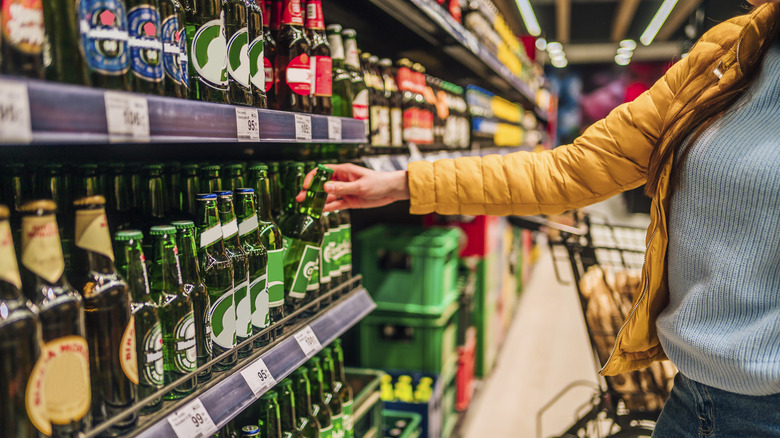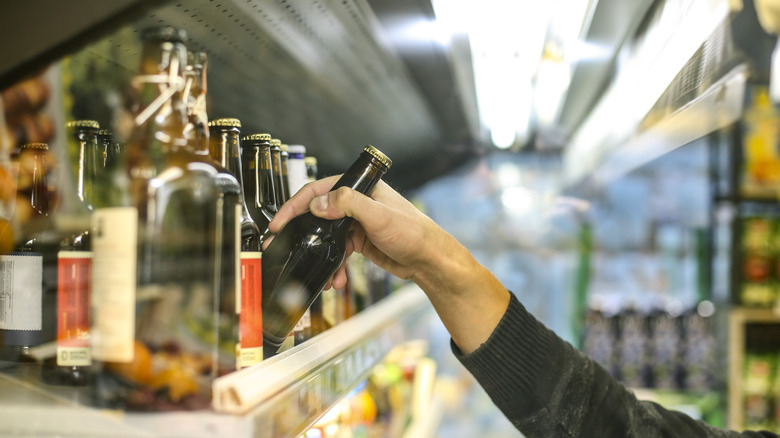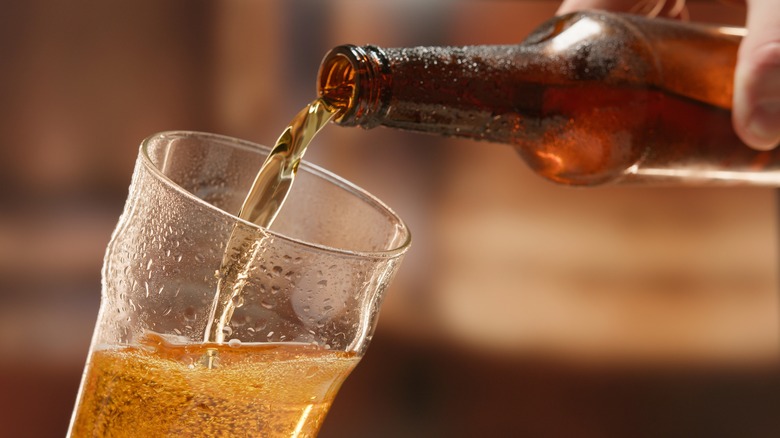Why It's Actually Important To Check Beer Expiration Dates
Before you crack open a can of your favorite refreshment, be sure to check the expiration date: That's right; beer can expire! While some kitchen staples stay fresh beyond their use-by dates, alcohols like liquor actually do expire, and beer is more susceptible than other types of alcohol (such as shelf-safe liquors, like vodka) to losing its delightful fizz and flavor because it has a lower alcohol content.
There's no industry standard for when beer expires, but most brewers include expiration dates anywhere from three to nine months from bottling. Despite this, at room temperature and away from direct sunlight, beer can usually be enjoyed at least five months past its expiration date. Once beer starts to lose fizz and flavor, it can't be reversed, so it's important to store it correctly from purchase. A few key factors, such as the type of beer, the color of the bottle, and storage methods, play a role in how long beer lasts.
What causes beer to expire?
It's a common misconception that refrigeration makes beer invincible to expiration. While refrigeration can prolong a beer's freshness for up to three years, it will expire if it's incorrectly stored.
Some of the main culprits behind your beer's flat taste are exposure to UV light and oxygen and incorrect storage temperature. UV rays from sunlight exposure cause a chemical reaction in beer that changes its flavor profile, resulting in a flat (or downright unpleasant) taste. Similarly, exposure to oxygen triggers oxidation, a natural process that reduces carbonization — no more foam and bubbles! The optimal storage temperature outside of a refrigerator is between 45 degrees Fahrenheit and 55 degrees Fahrenheit. If your beer warms above this recommended temperature range, oxidation speeds up.
Happily, expired beer won't actually harm you. The brewing process includes fermentation, which, coupled with beer's alcohol content and low pH level, creates an incompatible environment for harmful microorganisms. As long as your beer is well-sealed, it's unlikely to make you sick.
Keep your beer fresher for longer
Luckily, there are tips you can follow to ensure your beer stays crisp. You can be smart about how you buy beer to avoid it skunking in storage. Choose beer brands bottled in dark glass for extra UV protection. You'll notice that beer contained in lighter glass bottles, such as pale green, has a much shorter shelf life. Because cans prevent UV exposure, canned beer also lasts longer than beer stored in glass bottles.
Beer type plays a role too. If you're concerned about longevity, opt for beers that have lower hops content, such as an American lager or ale-style beer. Beers that have the highest alcohol content, like barley wines or imperial stouts, can last for years. Hops-heavy beers, like India Pale Ales (IPAs), are more likely to expire quickly because hops are more chemically sensitive to UV exposure than other brewing ingredients.
For optimal freshness, store your cans or bottles in a cool dark place, like a pantry cupboard, for four to six months. For even longer storage, you can keep your beer for about six months in a fridge. Keep in mind that these guidelines only work for unopened beer! Exposure to oxygen, temperature changes, and UV light mean that an opened beer retains its fizzy goodness in a fridge for only one to three days, regardless of the expiration date.



